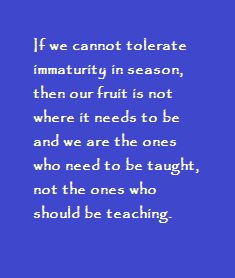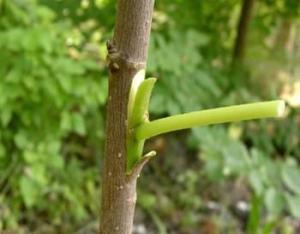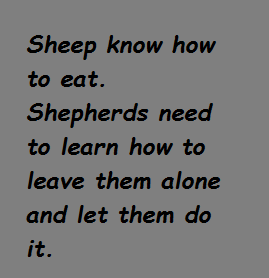The Character of God as Agriculturalist Pt 7: All things in due season
So much of scripture involves seasonal language, and so the reference cannot be ignored.
.
Ecclesiastes 3
3 To every thing there is a season, and a time to every purpose under the heaven:
2 A time to be born, and a time to die; a time to plant, and a time to pluck up that which is planted;
3 A time to kill, and a time to heal; a time to break down, and a time to build up;
4 A time to weep, and a time to laugh; a time to mourn, and a time to dance;
5 A time to cast away stones, and a time to gather stones together; a time to embrace, and a time to refrain from embracing;
6 A time to get, and a time to lose; a time to keep, and a time to cast away;
7 A time to rend, and a time to sew; a time to keep silence, and a time to speak;
8 A time to love, and a time to hate; a time of war, and a time of peace.
.
Thanks to the musical group The Byrds, this might just be the most famous passage of scripture on earth. But what is it telling us? I believe this passage by Solomon is about patience and wisdom, I believe it is about the Fruit of the Spirit. In it, I see the development of love, joy, peace, patience, kindness, goodness, faithfulness and self-control. I look at this beautiful passage and see that things do not start out perfect, that we can expect tribulation. I see the refinement process. I see maturation and things moving forward. I see that things have to happen in seasons so that we can reap a harvest later. I see the balance that should come with experience.
.
Let’s be honest, we start out as the types of people who want to know it all now, we want to be mature now. But knowledge and maturity come with a price. Knowledge comes with time, experience and dedicated study. Maturity comes with time, experience and endurance. But neither knowledge nor maturity are complete without the revelation of God. We can have a worldly sort of knowledge, we can have a worldly substitute for maturity — but without a connection to the divine it is largely empty.
.
Unfortunately, the church has pushed us towards worldly excess in knowledge and worldly standards of maturity.
.
Knowledge for knowledge sake is an empty pursuit. To be a holy pursuit, that knowledge must be for the purpose of being conformed into His image, into the very representation of His character, into the sort of person who can fit into the community of His earthly Temple of living stones. If our final goal is not to glorify Him through our character and through His collective community, then our pursuit is worldly. It isn’t that we be known, but that He be known.
.
Maturity, as the world views it, is pretty much behaving yourself in a way appropriate to the given situation, as determined by the cultural norms. Generally when I hear someone say, “Oh grow up!” it is not because they want me to behave in a godly manner, but according to an ungodly manner. They want me to have no standards outside of the cultural norms of THEIR community — whether that community be the local church or Hollywood. Godly maturity is a self-sacrificial maturity. We decrease so that He can increase. We stop assuming that our desires are holy, or Spirit led, or even honest. We begin to question ourselves, as all children do when they begin to develop empathy. Only now we are adults who have come into the community of faith and the rules that governed out behavior as worldly children are no longer sufficient. We are more dangerous now, we are more willful in many ways, and we are often convinced that we are mature because we are now adults.
.
But God never called us to be adults. He called us to be mature children. Adults are independent, but children are by their nature dependent upon their parents. Adults forge their own way, but children are learning to be adults by watching their parents. Adults do as they wish, but children have restraints. Adults are masters of their own homes, but we are brides waiting for our Bridegroom and as such have not left our Father’s house. You see how the mature child mindset is completely at odds with the mature adult mindset?
.
All good things in time. We do not start out mature. It is unreasonable to expect people to come out of the world with any sort of real maturity. It is unreasonable to try to train up a dependent babe as you would a mature adult. With adults you tell them what to do and expect them to do it, but children have to be guided and allowed to figure things out so that they can truly learn, and part of that is watching to see what they are ready for and not just pushing them according to what we want them to know and how we want them to do it. One of the biggest problems we have in religious circles is not allowing for immaturity and ignorance (not in the nasty insulting sense of the word, but the recognition that we naturally do not know what we have not been taught!). I don’t expect someone new to God’s ways to do very much right, and why should I? How unfair would it be? And the temptation is there, while we are immature and unloving still, to start to impose heavy burdens upon those who are still learning to walk. And it is most unloving (and unbiblical) to want rigid conformance now.
.
Can you imagine taking a 9 month old who is still crawling, or not even crawling yet, and telling them to stand up and walk? And then telling them they are rebellious for their inability to do it yet? To everything there is a season. No one walks their way out of the womb.
.
Can you imagine taking a preschooler and telling them to do multiplication because you don’t want to take the time to teach them their numbers and addition and subtraction first? To everything there is a season. Even prodigies need to be taught the basics, or they will fail.
.
Can you imagine criticizing a deaf person for not being able to hear, or a blind person for not being able to see? To everything there is a season. If you want them to be able to hear or see, then get to work praying for them.
.
Can you imagine getting angry at a seed for not producing a hundred-fold harvest the day after it was planted? To everything there is a season.
.
I look at these examples, and what I see is not a failure in the babe of the Kingdom, but in those who do not recognize the seasons. If we do not understand the seasons, then we do not understand the community life as recorded in scripture. The seasons were given to us, by God, in order to teach us about the patient nature of His character, that He not only understands the concept that things take time, but that it was part of His design. Yes, He expects growth, but He expects it to happen “in season.” We need to do the same. It’s part of His compassion and mercy, and when we do not display that patient compassion and loving-kindness and gentle mercy, then we are sowing chaos, faithlessness and our lack of self-control into the lives of others. If we cannot tolerate immaturity in season, then our fruit is not where it needs to be and we are the ones who need to be taught, not the ones who should be teaching.




